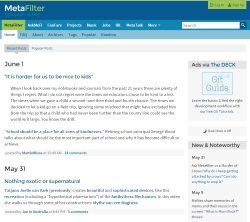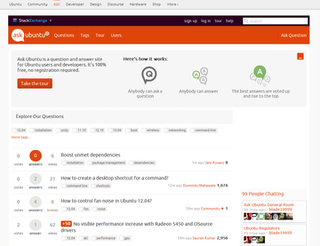The topic of this article may not meet Wikipedia's general notability guideline .(August 2021) |
The Internet FAQ Consortium, also known as the Internet FAQ Archives, is a collection of USENET Frequently Asked Questions (FAQs) postings. [1]
The topic of this article may not meet Wikipedia's general notability guideline .(August 2021) |
The Internet FAQ Consortium, also known as the Internet FAQ Archives, is a collection of USENET Frequently Asked Questions (FAQs) postings. [1]
A frequently asked questions (FAQ) list is often used in articles, websites, email lists, and online forums where common questions tend to recur, for example through posts or queries by new users related to common knowledge gaps. The purpose of a FAQ is generally to provide information on frequent questions or concerns; however, the format is a useful means of organizing information, and text consisting of questions and their answers may thus be called a FAQ regardless of whether the questions are actually frequently asked.

Sir Timothy John Berners-Lee, also known as TimBL, is an English computer scientist best known as the inventor of the World Wide Web. He is a Professorial Fellow of Computer Science at the University of Oxford and a professor at the Massachusetts Institute of Technology (MIT). Berners-Lee proposed an information management system on 12 March 1989, then implemented the first successful communication between a Hypertext Transfer Protocol (HTTP) client and server via the Internet in mid-November.

The World Wide Web (WWW), commonly known as the Web, is an information system enabling documents and other web resources to be accessed over the Internet.
The World Wide Web Consortium (W3C) is the main international standards organization for the World Wide Web. Founded in 1994 and led by Tim Berners-Lee, the consortium is made up of member organizations that maintain full-time staff working together in the development of standards for the World Wide Web. As of 21 March 2022, W3C had 459 members. W3C also engages in education and outreach, develops software and serves as an open forum for discussion about the Web.

An Internet forum, or message board, is an online discussion site where people can hold conversations in the form of posted messages. They differ from chat rooms in that messages are often longer than one line of text, and are at least temporarily archived. Also, depending on the access level of a user or the forum set-up, a posted message might need to be approved by a moderator before it becomes publicly visible.
The Best Page in the Universe is a personal satirical humor website created by George Ouzounian, better known as Maddox, of Salt Lake City, Utah. Launched in 1997 without any high expectations, the website is primarily a personal homepage for Maddox to host his writings while working as a telemarketer for a small software company. Over time, the website became known by word of mouth and became exceptionally popular which allowed Maddox to leave his day job as a telemarketer and commit to writing full-time.

MetaFilter, known as MeFi to its members, is a general-interest community weblog, founded in 1999 and based in the United States, featuring links to content that users have discovered on the web. Since 2003, it has included the popular question-and-answer subsite Ask MetaFilter. The site has eight paid staff members as of December 2021, including the owner. MetaFilter has about 12,000 active members as of early 2011.
Strategy guides are instruction books that contain hints or complete solutions to specific video games. The line between strategy guides and walkthroughs is somewhat blurred, with the former often containing or being written around the latter. Strategy guides are often published in print, both in book form and also as articles within video game magazines. In cases of exceptionally popular game titles, guides may be sold through more mainstream publication channels, such as bookstores or even newsstands. Some publishers also sell E-Book versions on their websites.
Internet Systems Consortium, Inc., also known as ISC, is a Delaware-registered, 501(c)(3) non-profit corporation that supports the infrastructure of the universal, self-organizing Internet by developing and maintaining core production-quality software, protocols, and operations. ISC has developed several key Internet technologies that enable the global Internet, including: BIND, ISC DHCP and Kea. Other software projects no longer in active development include OpenReg and ISC AFTR.
Answers.com, formerly known as WikiAnswers, is an Internet-based knowledge exchange. The Answers.com domain name was purchased by entrepreneurs Bill Gross and Henrik Jones at idealab in 1996. The domain name was acquired by NetShepard and subsequently sold to GuruNet and then AFCV Holdings. The website is now the primary product of the Answers Corporation. It has tens of millions of user-generated questions and answers, and provides a website where registered users can interact with one another.
The Internet Public Library was a non-profit, largely student-run website managed by a consortium, headed by Drexel University. Visitors could ask reference questions, and volunteer librarians and graduate students in library and information science formed collections and answered questions. The IPL opened on March 17, 1995. On January 1, 2010 it merged with the Librarians' Internet Index to become ipl2. It ceased operations completely on June 30, 2015.
Office Genuine Advantage (OGA) was a program by Microsoft, similar to Windows Genuine Advantage (WGA), which required users of the Microsoft Office software to validate their copy of Microsoft Office to download non-critical updates and other downloads such as addons and samples.
WebCite was an on-demand archive site, designed to digitally preserve scientific and educationally important material on the web by taking snapshots of Internet contents as they existed at the time when a blogger or a scholar cited or quoted from it. The preservation service enabled verifiability of claims supported by the cited sources even when the original web pages are being revised, removed, or disappear for other reasons, an effect known as link rot.

GameFAQs is a website that hosts FAQs and walkthroughs for video games. It was created in November 1995 by Jeff Veasey and was bought by CNET Networks in May 2003. It is currently owned by Fandom, Inc. since October 2022. The site has a database of video game information, cheat codes, reviews, game saves, box art images, and screenshots, almost all of which are submitted by volunteer contributors. The systems covered include the 8-bit Atari platform through modern consoles, as well as computer games and mobile games. Submissions made to the site are reviewed by the site's current editor, Allen "SBAllen" Tyner.

Fark is a community website created by Drew Curtis that allows members to comment on a daily batch of news articles and other items from various websites. The site receives many story submissions per day and approximately 100 of them are publicly displayed on the site, spread out over the main page as well as topical tabs that are organized as entertainment, sports, geek, politics and business). Curtis says the stories are selected without intentional political bias, but that he tries to run both far-left and far-right articles.
Extensible HyperText Markup Language (XHTML) is part of the family of XML markup languages. It mirrors or extends versions of the widely used HyperText Markup Language (HTML), the language in which Web pages are formulated.

The Wayback Machine is a digital archive of the World Wide Web founded by the Internet Archive, a nonprofit based in San Francisco, California. Created in 1996 and launched to the public in 2001, it allows the user to go "back in time" and see how websites looked in the past. Its founders, Brewster Kahle and Bruce Gilliat, developed the Wayback Machine to provide "universal access to all knowledge" by preserving archived copies of defunct web pages.

The International Internet Preservation Consortium is an international organization of libraries and other organizations established to coordinate efforts to preserve internet content for the future. It was founded in July 2003 by 12 participating institutions, and had grown to 35 members by January 2010. As of January 2022, there are 52 members.

Ask Ubuntu is a community-driven question and answer website for the Ubuntu operating system. It is part of the Stack Exchange Network, running the same software as Stack Overflow.

archive.today is a web archiving site, founded in 2012, that saves snapshots on demand, and has support for JavaScript-heavy sites such as Google Maps and progressive web apps such as Twitter. archive.today records two snapshots: one replicates the original webpage including any functional live links; the other is a screenshot of the page.